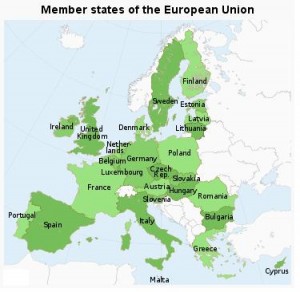Merkel Draws Red Lines Ahead Of Eurozone Summit
By EurActiv
As eurozone heads of state prepare for a summit on Thursday (21 July) to put together a second bailout package for debt-laden Greece, German Chancellor Angela Merkel said she wanted clear commitments from private investors that they would contribute to further funding.
Late on Friday (15 July), the services of European Council President Herman van Rompuy issued a short statement announcing that a summit of the euro zone would be held on 21 July in Brussels.
Starting at midday, the summit agenda “will be the financial stability of the euro area as a whole and the future financing of the Greek programme”.

21 July is Belgium’s National Day, and the local press predicts that Brussels police will be severely tested by having to handle in parallel two events of such magnitude.
The announcement went some way to defuse uncertainty over the EU’s readiness to act to prevent contagion from the Greek crisis from spreading to Italy and possibly other EU countries.
But unlike on previous occasions, Van Rompuy appears to have called the summit without securing agreement in principle on the major issue: how to involve the private sector in contributing to the new package.
“I have asked for the preparatory work to be brought forward inter alia by the finance ministries,” Van Rompuy said in his statement.
Despite describing the summit as “urgently necessary,” Chancellor Merkel said on Sunday that she would only attend if lower-ranking officials had already prepared a clear rescue plan. “I will only go there if there is a result,” she said, quoted by Reuters.
Another potential obstacle to involving the private sector appears to be the European Central Bank (ECB), which is opposed to any measure that would prompt credit rating agencies to declare a Greek default, even on a limited basis.
ECB President Jean-Claude Trichet warned that he would not accept collateral from a country that had defaulted, saying it would be up to eurozone governments to support the banking system of that country if needed.
Governments, he added, had been warned “in no uncertain terms and using all possible means”.
Slashing of Greece’s debt in sight?
Greece received a €110-billion bailout last year from the European Union and the International Monetary Fund (see ‘Background’), but the country now needs another package of a similar size if it is to remain solvent beyond 2012.
Greek Prime Minister George Papandreou said that EU leaders had finally accepted the idea of easing his country’s debt burden.
“It is the first time that Europe has recognised and has placed on the table the issue of reducing the debt burden on the Greek people,” he said, quoted by the daily Kathimerini. “This alone is a very positive development,” he added.
Although it is not yet clear what might be agreed at the summit, the idea of Greece being lent money from the European Financial Stability Facility to buy back its bonds at market rates, thereby reducing its debt load, has dominated the debate over the past few days.
“We are at the stage of evaluating the best possible solutions,” said Papandreou. “Solutions that do not cause side effects.”
Officials and private economists estimate that Greece’s debt would have to be cut by about half, to 80% of gross domestic product, to make it manageable.
Rehn calls for Irish bailout loans to be lengthened
In the meantime, Economic and Monetary Affairs Commissioner Olli Rehn called for interest rates on Ireland’s loans and the maturity of its debt to be lengthened.
“Ireland provides hard evidence that the EU-IMF conditional financial support approach is working,” Rehn wrote in an article in the Sunday Business Post.
“The efforts should be encouraged by lengthening the maturities of the loans and lowering the interest rates.”
Dublin has been asking for lower interest rates on its European loans for months but has faced opposition from France, which wants Ireland to raise its 12.5% rate of corporation tax in return, Reuters explains.
Dublin has refused to bow to such demands.
